I know this wouldn't count as “leisure reading” for many folks, but I'm reading (and very much enjoying) the book Freakonomics: A Rogue Economist Explores the Hidden Side of Everything. I'm a nerd, I read books like this for fun, I'm fine with that. Stick with me, since there are some applicable lessons for the Lean world, if you'll accept my summary and shared examples.
The link above is to the authors' official web page, where they offer to sign your book, in a pretty Lean manner (this would be a nice challenge for other authors to follow). Instead of the waste involved with shipping the book to the authors and the authors sending it back (with autograph), if you request it on the web page, they'll both sign a sticker, a bookplate, and they'll send it to you at their expense so you can put the sticker in the cover of the book or “on your forehead” if you want. Very nice gesture on their part, and waste reducing (not that FedEx, UPS, and the USPS would appreciate that revenue-stealing plan).
Back to the main content of the book. In the first chapter, Levitt and Dubner, give many examples of using incentives (or attempts to use incentives) to drive positive behavior or avoid negative behavior. That's a topic that should be of interest to Lean change agents and leaders — we're always trying to drive the right behaviors, such as “how do we get more employee suggestions?” or “how do we get people to follow the standard work?”
The authors layout three different types of incentives: economic, social, moral. In business, we tend to focus on economic incentives. In fact, saying “economic incentives” may well be redundant in most companies. We pay bonuses for hitting sales quota numbers, that's an economic incentive. We threaten to fire someone for not following safety procedures, the potential loss of one's paycheck is an economic incentive as well.
Let's look at something like wearing safety glasses (or, in a hospital, clinicians washing their hands). These are practices that should be followed 100% of the time, but aren't. An economic incentive might pay some sort of bonus for compliance or a penalty for non-compliance). A social incentive might involve some sort of social shame for non-compliance — is it somehow embarrassing to be caught doing the wrong thing? A moral incentive plays on the “it's just wrong” aspect of human nature.
Do incentives work? Sure, in theory, but the theory is also complicated (and the reality of incentives is complicated) because of human psychology. That's why, I believe, Dr. Deming taught us that understanding employee psychology was a critical aspect of management and leadership. The world isn't so simple so that we can rely only on smartly-designed economic incentives.
Back to Freakonomics:
“For every clever person who goes to the trouble of creating an incentive scheme, there is an army of people, clever and otherwise, who will inevitably spend even more trying to beat it.”
Very true, don't you think?
The book gives an example of a study conducted on day care centers. One of the parent behaviors that the day care centers want to discourage is late pickups, since this prevents the center from closing and increases their costs. In the study, the percentage of late pickups was measured for a few weeks. Then, some centers instituted a new policy of a $3 fine to any parent who was over 10 minutes late.
What happened with the penalty, the incentive for coming on time? Lateness went up!!!
Why? The Freakonomics authors say that the old moral or social incentives (embarrassment or guilt for being late) was now replaced by an economic incentive. $3 was hardly a huge penalty compared to the $360 monthly tab. Parents no longer felt guilty (the moral incentive) because they were now paying a trivial financial penalty.
That's quite an eye opening lesson. I don't know exactly what the answer is for challenges like safety glasses and hand washing. As we've discussed before, I would tend to rely more on direct observation and leadership more so than financial incentives that are easily ignored or easily gamed.
Please scroll down (or click) to post a comment. Connect with me on LinkedIn.
Let’s work together to build a culture of continuous improvement and psychological safety. If you're a leader looking to create lasting change—not just projects—I help organizations:
- Engage people at all levels in sustainable improvement
- Shift from fear of mistakes to learning from them
- Apply Lean thinking in practical, people-centered ways
Interested in coaching or a keynote talk? Let’s start a conversation.











I love the book too. I also also love their blog. this and that are my first 2 daily.
I have given copies of Freakonomics to several of my clients, and I have urged them to read it. I have also followed up with questions.
I started this when one client decided to give a bonus for shipments to reach a stretch target at the end of the year. They reached the target and there were high fives and checks all around. In January, their backorders increased 225%. They didn’t focus on the “right” orders and gamed the bonus at the expense of the customers.
I liked the book and the answer to why most drug dealers live with their mothers.